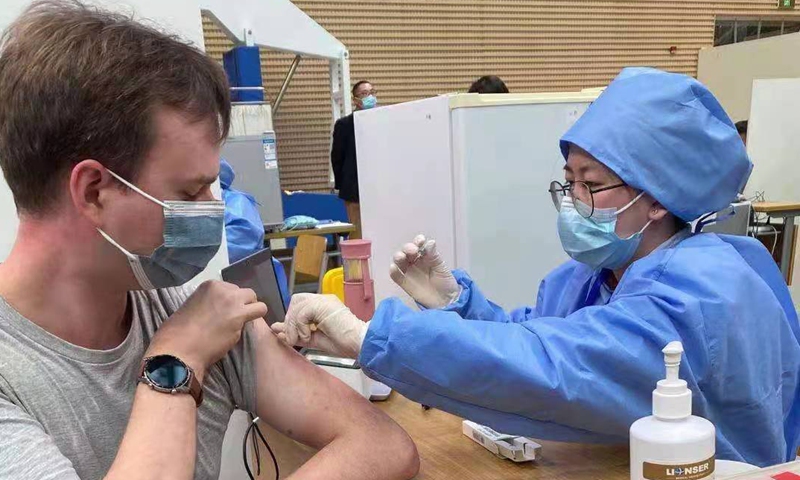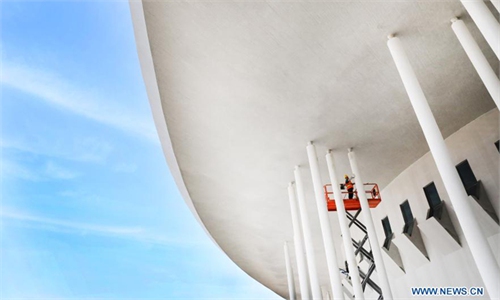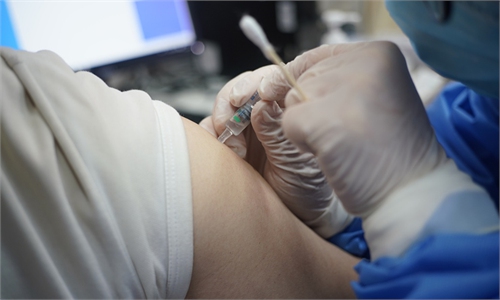China gives COVID-19 vaccines to foreign diplomats, reporters, to expand to ordinary people first in Shanghai

Maxim Shishkov, from Russia, gets COVID-19 vaccinated in Shanghai. Photo: Courtesy of Maxim Shishkov
Shanghai has become the first Chinese city to announce COVID-19 vaccine inoculation for foreigners while the Global Times learned some diplomats and foreign reporters in Beijing also received the doses. Foreigners reached by the Global Times expressed their excitement with Shanghai’s new plan.
Reporters learned from an employee at the Mexican Embassy that diplomats and families aged between 18 and 60 received vaccines in the same way as all other embassies in Beijing.
The Shanghai Health Commission announced on Tuesday night that the city will open reservations for foreigners to receive the two-dose Chinese inactivated vaccines starting March 29, based on the “arrangement of the State Council’s national mechanism for epidemic prevention and control.”
Foreigners who want to get the vaccine can make an appointment via the mobile app “Health Cloud.” The doses are free for those with social insurance in China and 100 yuan ($15.40) for people not covered by the insurance.
Beijing has not announced a plan like Shanghai’s for general foreign communities, but observers believe that more cities with large foreign communities may follow suit as the country is accelerating its inoculation pace.
Marco, a Shanghai-based Mexican who has worked in China for 9 years, told the Global Times on Wednesday that he is willing to get the doses. When asked about whether he has concerns over the real-name reservation as some others, Marco replied “Not me!”
Hannah, an American, was inoculated in January as part of a pioneer program for foreigners working at universities in Shanghai. She told the Global Times that she has “tons of friends who want to get vaccinated,” after they were aware of Shanghai’s project.
Bong Hyun-jun, deputy chairman of the Korean Chamber of Commerce in Shanghai, said he was not worried about safety or efficacy, but hoped that there will be some bonus policies, such as convenience in one-time visa applications for vaccine receivers.
Bong downloaded the Health Cloud app, finding the reservation channel not available yet. “We have no concerns over privacy as our personal information was already registered with Chinese authorities,” Bong said.
But a South Korean national surnamed Park remains cautious, telling the Global Times he would discuss with his wife before making the decision. “Staying in China is safe and there is no urgency to get the shots,” he said.
The Chinese Foreign Ministry also confirmed on Wednesday that around 150 reporters from 27 countries’ 71 news organizations had received Chinese vaccines the previous day in Beijing.
At the ministry’s press conference, a Japanese reporter from TV Tokyo who was vaccinated on Tuesday questioned China’s purpose with the arrangement, for which Hua responded “foreign journalists out of concern for their health and work expressed the hope to get the vaccines,” and the Foreign Ministry made the arrangement.
China did not report on the vaccination, Hua said.
Japanese reporter Masato Sato from TV Tokyo told the Global Times that his question was a misunderstanding due to a lack of fluency in English.
Sato said he was trying to ask China’s expectations, but did not realize that the tone turned a bit strong after the question was translated from Japanese to English, and he will practice his English and Chinese more.
Being inoculated is convenient for his work, Sato said, noting a large number of people have been inoculated in China and did not show serious adverse effects. Sato will receive his second dose on April 13.



